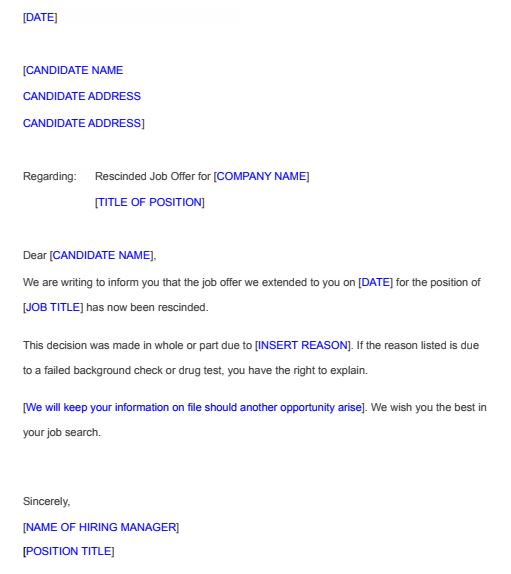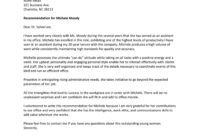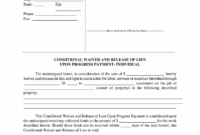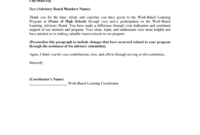Sometimes, despite the best intentions and thorough hiring processes, a situation arises where a job offer needs to be withdrawn. It’s a decision no employer takes lightly, as it can be a challenging and delicate process for all parties involved. Whether due to unforeseen changes within the company, a reevaluation of needs, or issues that come to light after the initial offer, understanding how to navigate this difficult step professionally is paramount.
The key to managing such a situation with grace and legal prudence lies in clear, respectful communication. This often involves sending a formal letter that clearly outlines the rescission of the offer. Having a well-structured rescind job offer letter template can serve as an invaluable guide, ensuring you cover all necessary points while maintaining a professional and empathetic tone throughout the process.
Understanding When and Why to Rescind an Offer
Withdrawing a job offer is never an ideal scenario, and it’s typically considered a measure of last resort. Businesses invest significant time and resources into recruiting and extending offers, so when that decision needs to be reversed, it’s usually prompted by substantial reasons. Acknowledging the weight of this decision is the first step, and understanding the legitimate grounds for doing so can help mitigate potential fallout and legal challenges.
There are various circumstances that might compel a company to rescind an offer. Sometimes, these reasons are internal, reflecting a shift in the business environment or strategic priorities. Other times, they relate directly to information uncovered about the candidate themselves. It’s crucial that any reason for rescission is legitimate, non-discriminatory, and can be clearly articulated if necessary.
Common Scenarios for Withdrawing an Offer
Let’s explore some of the more frequent situations that necessitate the difficult decision to pull back a job offer. These aren’t exhaustive, but they represent a broad spectrum of reasons that HR professionals and hiring managers often face:

- Negative background check results or misrepresented qualifications. This is a common and legitimate reason, especially when critical information affecting job suitability is discovered.
- Unexpected changes in company budget or strategic direction. Economic downturns, project cancellations, or a sudden restructuring can eliminate the need for a previously approved role.
- Discovery of information that was not disclosed during the hiring process. This could include a candidate accepting another offer and not informing the original company, or new information surfacing about their professional conduct.
- Market shifts or economic downturns impacting the role’s necessity. Sometimes external forces beyond a company’s control make a position unviable before the candidate even starts.
Regardless of the specific reason, it’s imperative that the decision is made based on factual information and aligns with company policy and legal guidelines. Consulting with legal counsel is always recommended to ensure compliance and avoid potential disputes, especially if the situation is complex or sensitive.
Key Elements and Best Practices for a Rescind Job Offer Letter
Once the decision to rescind a job offer has been firmly made, the next critical step is to communicate it effectively and professionally. This is where a carefully drafted rescind job offer letter becomes invaluable. It serves as a formal record of the withdrawal and can help protect your company from future misunderstandings or legal challenges. The letter should be clear, concise, and empathetic, aiming to minimize distress while maintaining professional boundaries.
While the exact content might vary slightly depending on the specific reason for rescission, there are several essential elements that every effective letter should include. Adhering to these best practices ensures that your communication is both professional and legally sound. Remember, the goal is to be factual and firm without being accusatory or overly emotional.
Here are the critical components to consider including in your letter:
- Clear Statement of Rescission: Directly and unequivocally state that the job offer is being withdrawn. There should be no room for ambiguity.
- Reference to the Original Offer: Include the date of the initial job offer and the specific position that was offered. This helps connect the communication to the prior agreement.
- Reason (Optional but Recommended): While not always legally required, briefly and factually stating the reason for the rescission (if appropriate and legally safe) can provide clarity. However, avoid accusatory language or excessive detail that could open up further disputes. Sometimes, a general statement about "changing business needs" is sufficient.
- Effective Date: Specify when the rescission becomes effective. This helps clarify timelines.
- Next Steps/Logistics: Address any immediate logistical concerns, such as the return of company property if any was issued, or instructions regarding stopping onboarding processes.
- Expression of Regret: Maintain a respectful and empathetic tone. Acknowledge the candidate’s time and effort, and express regret for any inconvenience caused.
- Contact Information: Provide a point of contact for the candidate if they have any questions, typically someone from HR or the hiring manager.
It is always advisable to consult with legal counsel before sending a rescission letter, especially in situations where the reasons are sensitive or might be perceived as discriminatory. Timeliness is also crucial; send the letter as promptly as possible once the decision to rescind has been finalized to avoid further confusion or commitment on the candidate’s part. A thoughtful and well-executed rescission process can help safeguard your company’s reputation and minimize potential legal exposure.
Navigating the delicate process of withdrawing a job offer requires careful consideration, clear communication, and a strong commitment to professionalism. It’s a moment that can significantly impact both your company’s reputation and the individual involved, making a structured approach absolutely essential. Ensuring all legal and ethical considerations are met can prevent future complications and uphold your organization’s integrity.
Therefore, whether you’re dealing with an unexpected change in business strategy or a critical discovery during a background check, having a robust rescind job offer letter template at your disposal is more than just a convenience. It’s a vital tool for managing challenging HR situations with competence, clarity, and compassion, ultimately protecting your company and guiding you through a difficult but sometimes necessary decision.



